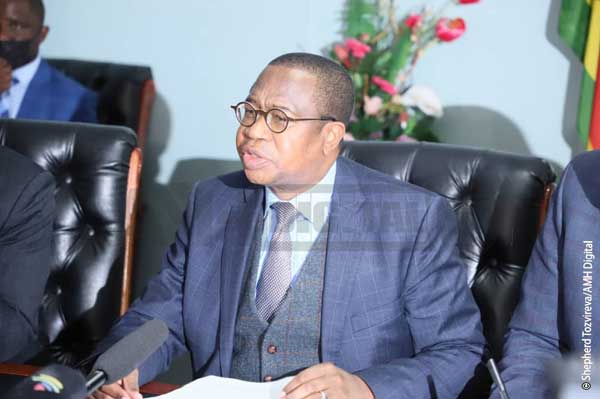
BY PROBLEM MASAU/TATIRA ZWINOIRA GOVERNMENT yesterday brought back the United States dollar as legal tender to stem rising inflation and restore confidence in the economy, but critics say the move will lead to more demands for salaries and wages to be pegged in the greenback.
Finance and Economic Development minister Mthuli Ncube also dangled housing loans to the country’s restive civil servants but more than doubled interest rates to 200% to render the incentive moot.
#UPDATE 🔴𝐀𝐝𝐝𝐢𝐭𝐢𝐨𝐧𝐚𝐥 𝐦𝐞𝐚𝐬𝐮𝐫𝐞𝐬 𝐭𝐨 𝐬𝐭𝐚𝐛𝐢𝐥𝐢𝐬𝐞 𝐭𝐡𝐞 𝐞𝐱𝐜𝐡𝐚𝐧𝐠𝐞 𝐫𝐚𝐭𝐞 𝐚𝐧𝐝 𝐜𝐨𝐧𝐭𝐫𝐨𝐥 𝐢𝐧𝐟𝐥𝐚𝐭𝐢𝐨𝐧▶️𝐅𝐮𝐞𝐥 𝐥𝐞𝐯𝐲 𝐫𝐞𝐝𝐮𝐜𝐞𝐝 – @MthuliNcube pic.twitter.com/qXN3xQmOR8
— NewsDay Zimbabwe (@NewsDayZimbabwe) June 27, 2022
President Emmerson Mnangagwa has been struggling to revitalise an economy that suffered decades of decline while the financial chaos that characterised the latter years of the late former President Robert Mugabe’s long reign, is again in evidence.
Read more:Inflation, at 191,7% is at its highest in years while the local currency has weakened to nearly $700 against the greenback. Price increases have become a daily occurrence, leaving desperate workers unable to cope as wages and salaries fail to keep pace.
While the US dollar is already widely used, the government said it would enshrine its use in the law to give market confidence.
- Chamisa under fire over US$120K donation
- Mavhunga puts DeMbare into Chibuku quarterfinals
- Pension funds bet on Cabora Bassa oilfields
- Councils defy govt fire tender directive
Keep Reading
“The market lacks confidence that the multi-currency system is here to stay for the foreseeable future. To eliminate speculation and arbitrage based on this issue, the government has decided to embed the multi-currency system and the continued use of the US dollar into law for a period of five years,” Ncube said.
Critics said the move by government will lead to prices being pegged in US dollars, with the local currency being used for change, as is already happening.
'𝐃𝐮𝐫𝐢𝐧𝐠 𝐭𝐡𝐞 𝐆𝐍𝐔 𝐩𝐞𝐫𝐢𝐨𝐝, 𝐛𝐚𝐬𝐢𝐜 𝐬𝐚𝐥𝐚𝐫𝐲 𝐟𝐨𝐫 𝐜𝐢𝐯𝐢𝐥 𝐬𝐞𝐫𝐯𝐚𝐧𝐭𝐬 𝐰𝐚𝐬 𝐧𝐨𝐭 𝐔𝐒$𝟓𝟒𝟎 (𝐢𝐭 𝐰𝐚𝐬 𝐔𝐒$𝟐𝟏𝟔); 𝐭𝐡𝐞 𝐞𝐱𝐜𝐡𝐚𝐧𝐠𝐞 𝐫𝐚𝐭𝐞 𝐰𝐚𝐬 𝐔𝐒$𝟏: 𝐙𝐖$𝟐.𝟓' – 𝐏𝐞𝐫𝐦 𝐒𝐞𝐜 𝐆𝐞𝐨𝐫𝐠𝐞 𝐆𝐮𝐯𝐚𝐦𝐚𝐭𝐚𝐧𝐠𝐚 pic.twitter.com/aE0zopQUoT
— NewsDay Zimbabwe (@NewsDayZimbabwe) June 27, 2022
In a statement, opposition Citizens Coalition for Change said: “The main policy interventions announced by Ncube are a reiteration of policies that already exist and have failed to curb hyperinflation and stabilise prices. Unfortunately, the measures announced today have no capacity to transform the ailing fortunes of the Zimbabwean economy. The purported entrenchment of the multi-currency system and interbank market in law is not new.”
Analysts yesterday said the interest rate hikes will trigger a rise in inflation, deter workers and industries from accessing loans, and pass on costs of goods and services onto consumers that have resorted to borrowing to fund their daily expenses.
In its justification of the interest rate increases, the Reserve Bank of Zimbabwe (RBZ) said this would assist to mop up excess liquidity in the market and curb speculative borrowing.
“The Monetary Policy Committee reviewed interest rates and statutory reserves with effect from 1st July 2022 as follows – increasing the bank policy rate from 80% to 200% per annum,” RBZ governor John Mangudya said in a statement soon after Ncube dangled loans for civil servants’ housing stands.
Ncube also announced other monetary and non-monetary supportive measures for civil servants following a strike last week by nurses and teachers.
His (Ncube’s) measures were, however, a repeat of some of the civil servants’ incentives announced last year by government.
“With particular regard to the health services sector, government has reviewed upwards the health sector specific allowances which apply to doctors and laboratory scientists,” Ncube said during the media briefing.
“In addition, government has reviewed the non-monetary benefits for the health sector including the following: provision of institutional housing for health workers starting with Harare and Bulawayo; provision of housing loan guarantees; provision of efficient transport facilities, starting with referral/central hospitals addressing deficiencies in the cafeteria system and re-operationalising the system; and local production and sourcing of uniforms for health personnel,” he said.
On teachers, Ncube said: “Payment of performance awards which had been withheld due to financial constraints, have been restored and these will now be processed effective July 1, 2022. For this purpose, members will now be placed on their correct employment grades.”
Ncube also said the government will pay school fees for up to three biological children per teaching family, adding that the government will also provide 34 000 housing units as institutional accommodation for teachers.
Civil servants yesterday rubbished Ncube’s measures to cushion them from economic challenges saying there was nothing new in his promises.
“The measures announced by the minister show a clear disregard for the plight of civil servants and teachers,” Educators Union of Zimbabwe president Tafadzwa Munodawafa said.
“The teachers raise a genuine concern where the poverty datum line is above $130 000 and an increase of 100 % in their salaries doesn’t even begin to cut it. Our suffering is real. Our genuineness is real too. Teachers have shown a desire to serve their clients ahead of their needs. However, we are concerned by the lack of genuineness on the part of the government through Mthuli. It is clear that teachers are being punished for having their hearts in the right place,” she said.
Ncube also announced incentives for MPs which include importation of second vehicles duty-free.
“Government has introduced a duty free importation of a second motor vehicle for use by parliamentarians in their public service work,” Ncube said.
Economist Farai Gwenhure said the government was running out of ideas.
“Government did not announce anything new except hiking interest rates and introducing a law to make the US dollar a legal tender for the next five years. However, the measures did not address the root causes of inflation which is the indexing of prices in local currency to the foreign currency. As long as the country uses the dual pricing regime, workers’ earnings will continue to be eroded,” he said.











